 Petzlover
Petzlover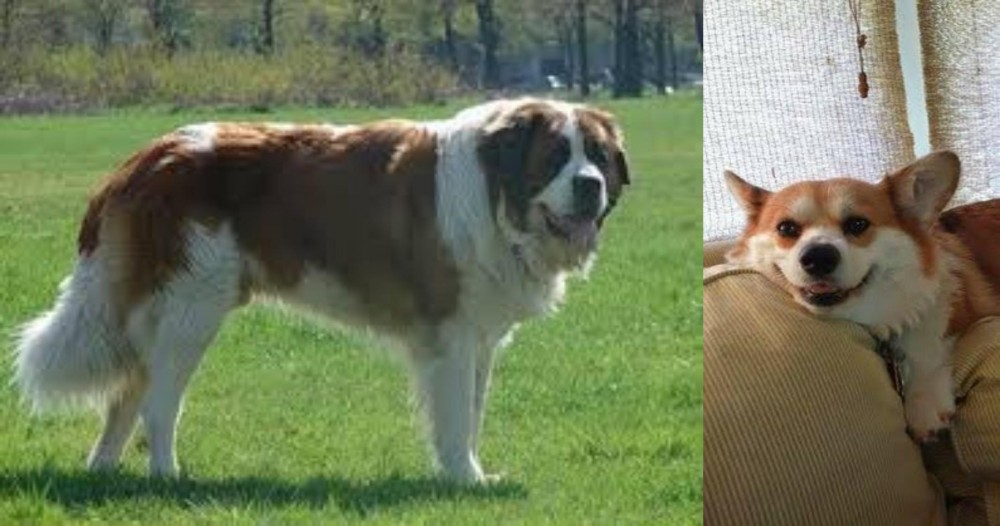 Moscow Watchdog is originated from Russia but Pembroke Welsh Corgi is originated from United Kingdom. Moscow Watchdog may grow 39 cm / 16 inches higher than Pembroke Welsh Corgi. Moscow Watchdog may weigh 54 kg / 120 pounds more than Pembroke Welsh Corgi. Moscow Watchdog may live 4 years less than Pembroke Welsh Corgi. Both Moscow Watchdog and Pembroke Welsh Corgi has almost same litter size. Both Moscow Watchdog and Pembroke Welsh Corgi requires Moderate Maintenance.
Moscow Watchdog is originated from Russia but Pembroke Welsh Corgi is originated from United Kingdom. Moscow Watchdog may grow 39 cm / 16 inches higher than Pembroke Welsh Corgi. Moscow Watchdog may weigh 54 kg / 120 pounds more than Pembroke Welsh Corgi. Moscow Watchdog may live 4 years less than Pembroke Welsh Corgi. Both Moscow Watchdog and Pembroke Welsh Corgi has almost same litter size. Both Moscow Watchdog and Pembroke Welsh Corgi requires Moderate Maintenance.
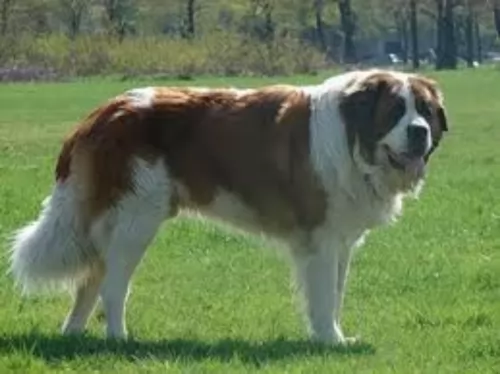 The Moscow Watchdog is a cross between the Caucasian Oytcharka, the St. Bernard and other Russian hound dogs. This large breed dog was developed in the Soviet Union for the purpose of being guard dogs. It had the awareness and assertiveness of the Oytcharka and the size, intelligence and attractiveness of the St. Bernard. The breed is common in Russia today but hardly seen anywhere else even though they were exported to the United States and Europe. The breed had the first U.S. born litter in 2015 and it is not AKC recognized.
The Moscow Watchdog is a cross between the Caucasian Oytcharka, the St. Bernard and other Russian hound dogs. This large breed dog was developed in the Soviet Union for the purpose of being guard dogs. It had the awareness and assertiveness of the Oytcharka and the size, intelligence and attractiveness of the St. Bernard. The breed is common in Russia today but hardly seen anywhere else even though they were exported to the United States and Europe. The breed had the first U.S. born litter in 2015 and it is not AKC recognized.
Following the second world war crime was on the rise in the Soviet Union and a new breed of dog was needed to counter this trend. The dog had to be adaptable to very cold temperatures, snowy weather and have a guard dog personality and ability. The breed was called on to guard such locations as railroads, government offices, warehouses, infrastructure and labor camps.
The project to develop this breed was led by General Medvedev beginning in 1946 at the Central School of Military Kynology – which was a department of the Soviet Ministry of Defense. It took many years to develop the Moscow Watchdog which then became a very successful breed.
It took until 1985 for the breed to be “officially” recognized in the Soviet Union and until 1992 to be recognized by the Federation of Dog Breeders in Russia and until 1997 for the standard to be approved by the Russian Kennel Club. They are still working with the FCI to gain international recognition for the breed. At the moment they are considered a part of the Molosser group and shown in the “Special Show” in Russia.
Committed breeders brought the Moscow Watchdog to Hungary in 1986 in order to make the breed more popular. In addition to this there were many breeders from previous Soviet States that wanted to preserve the breed as well. There were about 500 Moscow Watchdogs in Hungary around then. Currently there are about 27 Moscow Watchdogs in the United States. The breed is known to be a gentle giant and very much a family dog these days.
 The Pembroke Welsh Corgi is known as an achondroplastic, a dwarf breed, and they come from Pembrokeshire in Wales. Not much is known of the dog's history but it is believed that the dogs came over with Flemish weavers who settled in Pembrokeshire way back in the 12th century already.
The Pembroke Welsh Corgi is known as an achondroplastic, a dwarf breed, and they come from Pembrokeshire in Wales. Not much is known of the dog's history but it is believed that the dogs came over with Flemish weavers who settled in Pembrokeshire way back in the 12th century already.
This dog breed has always been a cattle herding dog. Their fame has come from them being a favorite dog breed for the British royals and particularly of Queen Elizabeth II.
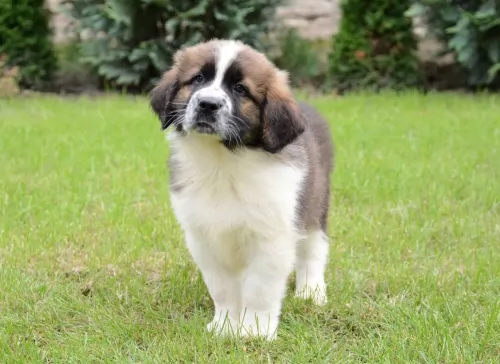 The Moscow Watchdog is related to the mountain dogs and is a very large breed. They are sturdy, muscular and powerful. They have big heads and a thick double coat that sheds profusely four times a year. They have a long tail, an arched chest and an air of confidence.
The Moscow Watchdog is related to the mountain dogs and is a very large breed. They are sturdy, muscular and powerful. They have big heads and a thick double coat that sheds profusely four times a year. They have a long tail, an arched chest and an air of confidence.
He is in the Mastiff family and is smart and trainable. He is not clumsy but has big bones. He is surprisingly agile and active for a dog his size. Unlike the St. Bernard he is not a couch potato. He is also differentiated from the St. Bernard because he does not drool.
These dogs are large but they’ve got a gentle temperament and are good with kids, being playful and energetic with them.
Even though he is a docile dog, you want him trained and socialized, and then he gets along well with other pets too. His sheer size makes it that it is best to supervise him when he’s around small children. He is also a protective dog breed, willing to bond closely to, and protect his human family.
 The Pembroke Welsh stands at between 25 and 30cm in height and weighs between 11 and 14kg.
The Pembroke Welsh stands at between 25 and 30cm in height and weighs between 11 and 14kg.
The coat is thick and shortish and can be fawn or a mix of colors such as white, cream, tan and black. The coat sheds quite a bit. Some of these dogs are born with their tail naturally short while others have the tail docked to give it that distinct look.
Pembroke Welsh Corgis are loving dogs and with their human families, they want to become involved with their lives. They like to please their owners and are therefore easy to train and socialize, becoming very obedient and amicable.
They’re alert, intelligent dogs and make great watchdogs too. They get on well with other pets in the home as well as children.
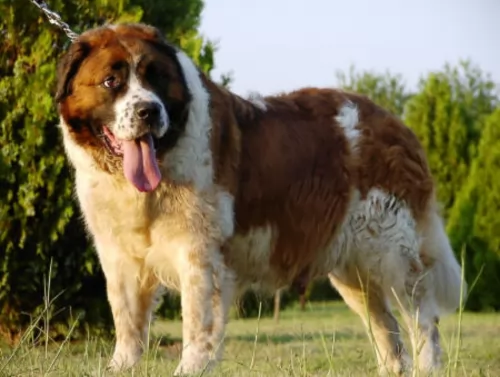 This is a large dog who likes to be involved and busy, even though he is so big. He isn’t suited to city life and being confined to a tiny garden as he needs space.
This is a large dog who likes to be involved and busy, even though he is so big. He isn’t suited to city life and being confined to a tiny garden as he needs space.
They’re independent dogs too and you can leave them alone during the day. He is social, so while you can leave them during the day while you’re at work, he’ll want your attention when you get back. They're such loving, loyal family pets that you owe it to him to make this gentle giant of a dog as happy as can be.
 British royalty has always loved the Pembroke Welsh Corgi and why not? He is loving, energetic, feisty, gentle, calm, friendly and intelligent.
British royalty has always loved the Pembroke Welsh Corgi and why not? He is loving, energetic, feisty, gentle, calm, friendly and intelligent.
Able to adapt to life in the city or the countryside, he will however need to be exercised every day as he has always been a herding- and working dog, used to working.
If you’re willing to bring the Pembroke Welsh Corgi into your home, he’ll show you what a splendid pet and companion he can be for you too.
 Moscow Watchdog is looked upon as a fairly healthy dog breed but there are some risks such as hip dysplasia as well as some other large breed problems.
Moscow Watchdog is looked upon as a fairly healthy dog breed but there are some risks such as hip dysplasia as well as some other large breed problems.
With big dogs like this, hip dysplasia is a threat. Its an hereditary condition where the parent dogs pass down the problematic genes. Hip dysplasia results in inflammation and pain for your pet, and where once he loved to play, he is reluctant to and battles to get up after lying down.
 Pembrokes can live to be between 12 to 15 years. With good care they can live to be a ripe old age, but just like with any other dog, they can become ill with any of the many common dog illnesses there are.
Pembrokes can live to be between 12 to 15 years. With good care they can live to be a ripe old age, but just like with any other dog, they can become ill with any of the many common dog illnesses there are.
Some of these diseases are hip dysplasia, monorchidism and degenerative myelopathy. Being a small or short dog, they are also prone to obesity.
This is a condition where only one testicle descends and the other isn’t able to descend into the scrotum. Both testicles should be in the scrotum by 2 months of age. Monorchidism is usually genetic and you may find your dog licking his genital area quite a bit.
If you suspect your dog has monorchidism, you will need to make an appointment with your veterinarian.
This is a progressive disease of the spinal cord and is usually seen in older dogs, starting with your dog losing coordination in the hind limbs.You’ll notice your dog dragging his feet.
As the disease progresses, the limbs weaken and the dog even has difficulty with standing. Eventually the dog is unable to walk. With time your pet even suffers with urinary and fecal incontinence. Fortunately it isn’t a painful disease but you will want to speak to your vet for advice.
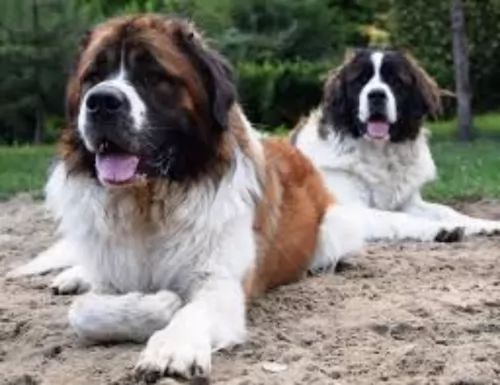 The Moscow Watchdog is a giant sized dog and will require a lot of regular exercise, and apart from a fairly brisk daily walk, will also need games and a run in the park.
The Moscow Watchdog is a giant sized dog and will require a lot of regular exercise, and apart from a fairly brisk daily walk, will also need games and a run in the park.
As a large dog requiring a regular dose of physical exercise as well as mental stimulation, he is better suited to life in the country or at least where there is a large garden.
The Moscow Watchdog has a medium length coat, and as a moderate shedder, you will need to simply brush his coat twice a week to remove loose hair. There is no professional grooming required for these dogs.
Homemade food is always a treat for a dog, but if you’re feeding your Moscow Watchdog commercially manufactured food because of the sheer convenience it provides, make sure the packaging says 'large- or giant dog breed' food. This way you know your pet is getting the right amount of minerals and vitamins for his size.
Always buy the best quality food to avoid giving your pet an overdose of colorants and preservatives. Try and give your pet some home-made food such as boiled chicken, some brown rice or pasta and some cooked vegetables such as sweet potatoes, carrots and spinach. These can be added to his kibble every now and again.
A simple diet like this agrees with your pet and he will be healthy and happy with his lot.
 If you bring a puppy home, make sure he gets his puppy vaccines at 8 weeks of age.
If you bring a puppy home, make sure he gets his puppy vaccines at 8 weeks of age.
Your puppy requires 4 meals a day. Make sure to always give your pet the best quality food there is to ensure his health. Avoid giving him spicy, human food. Dogs like simple, consistent diets which don’t upset the stomach. If you buy him commercially manufactured food, buy the best quality one that isn’t full of preservatives, colorants and fillers. Try and mix in some homemade food occasionally such as chopped up boiled chicken, brown rice or pasta and some cooked vegetables such as sweet potato, spinach and carrots. A little bit of raw meat occasionally will do wonders for your pet and he will have more energy, a shinier coat, less skin allergies and less inflammation.
Always ensure your pet has a constant supply of fresh, cool water.
Brush the Pembroke Welsh Corgi’s hair twice a week. Feel for any unusual lumps while doing this. Check inside and outside his ears for ticks and fleas and ear infections.
Trim his nails.
Make sure if he goes outside that he has a shady spot to lie down in.
Exercise him. Take him on walks.
Give him your love and attention.
Take him to the vet when you can see that he is sick.
Have your dog spayed or neutered if you don’t intend for it to have puppies.